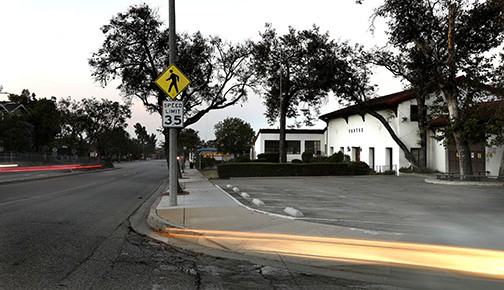Planning commission reaches compromise on VSSP parking

by Steven Felschundneff | steven@claremont-courier.com
In what may be a harbinger of future discussions regarding Village South, on Tuesday the Claremont Planning Commission reached a last minute compromise on parking restriction language, sending the Village South Specific Plan back to the Claremont City Council for one more try at final approval.
During its meeting last month the council could not muster enough votes to approve the VSSP due to disagreement over how much parking the plan should require per residential unit, and “parking reductions” whereby a builder can construct more housing and fewer parking spaces under certain specific conditions.
In the current VSSP plan, a developer could reduce the number of parking spaces offered several ways including creating car sharing programs like the Zipcars currently on the Claremont College campuses; by creating long and short term bicycle parking; and “unbundling,” when a builder sells living units and parking spaces separately.
If approved, the VSSP would create a special zoning area just south and west of the current Village where mixed-use transit oriented developments (TOD) would be created. The site is ideal for TOD because of its proximity to Metrolink, the future light rail line and because it is walkable to many other amenities including shopping and restaurants.
Housing advocates have championed the VSSP, and the parking reductions, as a last chance for the city of Claremont to finally build significant low income housing, arguing that builders would have a greater incentive to include affordable housing if they were freed from including too much parking.
On the other side of the issue, residents who live adjacent to the VSSP area argue that the plan already includes fewer parking spaces per residential unit than the Village Expansion and fear that any further reductions will result in spillover parking in their neighborhoods.
Language in the original document allowed for parking reductions of 20 percent for both unbundling and car sharing, plus an additional 10 percent for both long and short term bicycle parking for maximum total of up 60 percent. Staff revisions following feedback from the city council lowered unbundling to 15 percent, car sharing to 10 percent and short and long term bicycle to five percent each, for a total of 40 percent. Staff also asked the commission to approve a “range of acceptable reductions” from zero all the way to the current maximum.
Following a presentation from Principal Planner Chris Veirs, commissioner debate and public comment, the commission appeared ready to send the VSSP back to city council unaltered arguing that four years of public input, work from city staff and several commissions had produced a very good planning document.
The majority of public comment on Tuesday also favored keeping the current parking reductions, however the VSSP would likely not be approved if returned to the council unaltered.
Mr. Veirs proposed merging the two staff recommendations, providing the council with flexibility in how much parking reduction to leave in the document while establishing the new staff revisions as a minimum. For example, car sharing could be increased up to 10 percent but could not be less than five percent.
The commission approved the revised discretionary parking reduction, clearing the way for council to put the VSSP on the July 13 agenda.
The amount of parking that ultimately ends up in a Village South development depends on the needs created by that proposal—and city staff, the planning commission and the city council will have to approve any builder’s plans for construction to begin.
“All you have to do is read the language [in the plan], basically they [parking reductions] are up to amounts, our intention is to right size the parking,” Mr. Veirs said.
Keck Graduate Institute President Sheldon Schuster proposed a “shared parking” agreement allowing visitors to Village South to park on Keck’s campus during the evening peak hours for the future mixed-use development. Keck, which is adjacent to the VSSP site, also owns four acres in the plan area including the historic Vortox building. The university is one of several land owners that appear ready to cooperate with Arteco Partners’ and Village Partners’ plan to create the first development in Village South, which could begin as soon as the VSSP is approved.
With shared parking, two entities use the same parking spaces during different times of the day. An example might be a movie theater which operates at night and an elementary school that holds classes during the day.
“I promise this will be the most studied project in the history of Claremont, from a parking perspective,” Jerry Tessier president of Arteco Partners said.







0 Comments